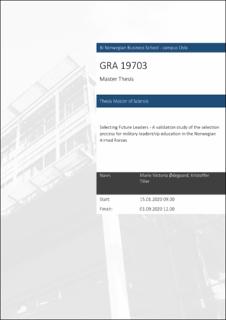| dc.description.abstract | The ability to predict future performance is crucial for sustainable selection
procedures. While several selection methods individually predict both performance
in job training programs and subsequent job performance, of particular interest is
the ability of a system of methods to predict performance in related yet different
domains.
This study investigates the extent to which the selection system for the
Norwegian Armed Forces’ Officer Candidate School is able to predict performance
during education and training, in addition to subsequent performance in the role as
a military leader. Furthermore, the relationship between selection, education and
subsequent leadership performance is investigated through assessing the
contribution of education and training in predicting leadership performance when
controlling for the effect of the selection system.
While the selection system is highly predictive of academic performance in
the education’s theoretical aspects, it is far less predictive of performance in
practical aspects and of subsequent performance in the role as a military leader.
Performance during education and training is, expectedly, highly predictive of
subsequent leadership performance. Paradoxically, it is performance in the
education’s practical aspects that contributes to subsequent leadership performance,
while academic performance in the education’s theoretical aspects appears to be
negatively (though not significantly) related to subsequent leadership performance.
The study concludes that the skills, competencies and abilities required for
learning in academic environments are not necessarily important for mastering the
practical aspects of military leadership. In such, a tailormade rather than generic
competency framework based on identification of specific skills, competencies and
abilities directly relevant to a specific job role and its context would facilitate
accurate definition of selection criteria, optimization of their use, and ultimately
greater accuracy in predicting subsequent on-the-job performance. | en_US |
